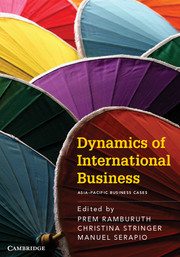Book contents
- Frontmatter
- Dedication
- Foreword
- Contents
- Contributors
- Preface
- Part I The Environment of International Business
- Part II Strategy and Entrepreneurship in International Business
- Part III Managing People in International Business
- 13 John Parker’s expatriate experiences in China
- 14 Dilemmas in working across cultures: Arun in a conundrum
- 15 Working in Chinese firms
- 16 Losing touch with the context: The story of Ravinaki Resort in Fiji
- 17 Foxconn: The complexity of quality control in a Chinese context
- 18 Quality through culture: Organisational development at New American Ice Cream
- Part IV Operating in International Markets
15 - Working in Chinese firms
Published online by Cambridge University Press: 05 August 2013
- Frontmatter
- Dedication
- Foreword
- Contents
- Contributors
- Preface
- Part I The Environment of International Business
- Part II Strategy and Entrepreneurship in International Business
- Part III Managing People in International Business
- 13 John Parker’s expatriate experiences in China
- 14 Dilemmas in working across cultures: Arun in a conundrum
- 15 Working in Chinese firms
- 16 Losing touch with the context: The story of Ravinaki Resort in Fiji
- 17 Foxconn: The complexity of quality control in a Chinese context
- 18 Quality through culture: Organisational development at New American Ice Cream
- Part IV Operating in International Markets
Summary
China’s remarkable growth is seen as an economic miracle – one that is having an increasing impact on the world. Like most things in China, working in Chinese firms differs in many significant ways from working elsewhere. This case focuses on the real-life experiences of employees working in two authentic companies that represent the two dominant forms of business ownership in China: privately owned enterprises (POEs) and state-owned enterprises (SOEs). Differences between working in the two types of companies are highlighted, particularly in the areas of career development, working environment and internal communication – all important areas that impact on the lives of employees. Understanding how Chinese business leaders and supervisors interact with their employees can inform Western business performance in China, as well as in international dealings with Chinese firms.
This case compares the experiences of Mr Qing, Ms King and Mr Wong, who worked for the Heilongjiang Yanglin Soybean Group (a POE), and Mr Su, Mr Gong and Mr Tian, who worked for Harbin No. 1 Tool Manufacture Ltd (an SOE).
Company profiles
Heilongjiang Yanglin Soybean Group (POE)
Heilongjiang Yanglin Soybean Group (‘Yanglin’), established in 1996, has become the second biggest privately owned cooking oil group in the Heilongjiang province of China, occupying a leading position in the national market. The core business of this enterprise is processing non-transgenic soybeans, but it also has extensive business involvement in grain marketing, rice processing, agricultural research, livestock and poultry breeding, hotel services, tourism resorts, logistics and other fields. It has 10 subsidiaries, with 1128 employees in total. The five existing soybean-processing production lines have an annual capacity of 1.8 million tonnes of soybeans, while the world-class refined rice production line annually processes 40 000 tonnes of rice.
- Type
- Chapter
- Information
- Dynamics of International Business: Asia-Pacific Business Cases , pp. 152 - 161Publisher: Cambridge University PressPrint publication year: 2013

